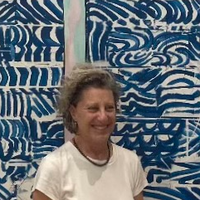On creating and following your own path
Prelude
Ryoichi Wada is a Japanese content creator who started his career as a stage writer and director at the age of 18. Since then, he’s been writing, directing, and producing theater, film, and animation projects. The 2018 Japanese hit movie One Cut of the Dead was based on his original story. He’s currently developing NINJAMASX, an original anime-based project that combines ninjas and hip hop, which will be developed in collaboration with artists and studios outside of Japan.
Conversation
On creating and following your own path
Writer and producer Ryoichi Wada discusses overcoming day-to-day hurdles, sticking to your vision, and the values and challenges of collaboration.
As told to Elle Nash, 1816 words.
Tags: Film, Animation, Television, Collaboration, Mental health, Time management, Success, Failure.
How did you manage to create your specific path?
When I was in college, I started out learning theater. I was looking to become an actor. Somewhere along the line in school I figured out that I was better at writing and directing. I also realized that creating a team and working with the team made me satisfied. From there I started to direct theater stuff, and also music, and from there I opened up my anime path.
Are you often managing multiple writing and directing projects at once? How do you stay organized?
When I get busy, I have a lot of partners I can share my work with. I get busy and there’s stuff that I just have to do. I do it without sleeping. And I like it.
Do you ever feel like you get burnt out if you’re not sleeping and you’re working really hard? How do you manage when you hit a point where you’re feeling stuck or unmotivated?
When it’s getting there, I like to look at art, something beautiful, the nature out in the open. To see those things calms me a little bit. It also helps to talk to somebody that I really respect in the business, or talking to my colleagues. That’s how I try to get some motivation out of them and get back with what I need to do.
Collaboration seems important to you, especially as a director. Have you ever worked with someone where it was difficult to collaborate with them or they were more difficult to work with? How did you overcome that?
Right now I’m in the middle of that, in a project I’m working on. The music for the anime [NINJAMASX] I’m working on is with a top US rapper. He’s a well known artist, and his status is high, so most of the time it’s difficult that everything is according to their schedule. There’s also time difference between Japan and the US. And, because of the pandemic, we haven’t had a chance to meet with them. It’s always on Zoom, or what have you, and I’ve never actually shook their hands or anything like that. That makes it hard.
How else has the pandemic affected your creative work over the last couple of years?
If there was no pandemic, I would have already been in the US in the last year. But maybe because of the pandemic, I was able to create the particular team I have right now for this project. So there’s good out of it, too.
Can you expand on that?
If I would’ve come last year, I had a strategy already and it would have gone the way [I had planned it]. But because I couldn’t come, I had to come up with a different strategy to meet with people and decide who to partner up with. I think I was able to find more people, or screen more people because of the pandemic. There were also more people available, and I was introduced to Kickstarter. I also met people like Jeff Gomez and a writer, Andrew Cosby, because of it. Because of the pandemic, I couldn’t come [right away] to the US and I had to stop and think a little bit. I had to gear up in a different way to create the team. Since I think I have a very good team right now, I feel that maybe the pandemic helped.
It kind of forced you to slow down and think a little more.
Exactly. With the creative, too.
How do you start a project? If you get an idea, what is that like for you, from the thought to beginning to manifest or materialize that idea?
When I’m watching a Netflix drama or something, I would look at some of them and go, “Oh, that is interesting. But, you know what? If I made it, it would’ve been way better.” That’s where it starts.
How do you know when a project that you’re working on is done?
It’s easier to understand that with my theater work and my music stages because you get the applause. With anime, I’m not sure because I’m not going to get an applause right away. I don’t get a reaction right away. I’m not sure if it’s when it starts or maybe the show grows to another project or if, since it started out as a series, maybe it becomes a feature. I’m not sure when where the actual goal is.
Have you ever abandoned a project? Is it okay to abandon a project? And how have you come to that decision?
I haven’t abandoned a project yet. Some things might not work, but I won’t give up on something.
As far as your creative work is concerned, how would you define success? You mentioned with theater you can tell when something is successful because the audience responds. When it comes to what you’re doing now with anime, even though you’re not sure how people are necessarily responding to it right now, how would you define the success of that project for you?
Failure is easy because if I’m not able to raise the money [to produce the show], that means it’s a failure. The first thing I wanted to make sure was that the story is told in anime. With success, there’s also licensing; it could become a feature, be comicalized [into manga], and there’s also merchandising. Even theatrical work, possibly. Those points are important for me, and if that is happening, then I feel successful.
What steps would you have to take to get to that level of success for you? What does your work entail on a day-to-day level?
What I’m doing right now is… The creative itself… I’m pretty happy with where I’m at. But what’s done is only in my mind, in my head. I’m about to join some creators over here [in the US]. From there the whole thing could be twisted and changed…and I like that idea. I like that I created an idea and somebody’s enhancing it and making things better. I’m very open to that. That’s what’s happening right now with some Hollywood people.
Is there a lot of feedback and criticism that goes back and forth between your initial idea and then of their vision for it? What is that process like?
Right now I’m working with some writers and they’re giving me ideas of maybe [how] it should be—[it should] go this way, that way. But they’re being very polite in their asking and all that. I like that so far. Most of the things [they suggest] I agree with. I feel that the project is being enhanced rather than going backwards.
Did you have or do you now have a day job in addition to what you’re doing? How? Can you talk a little bit about how that started? How did you transition to that?
When I was in my 20s, during the day I was practicing and working on theatrical stuff. Then I had another job at night to support the theatre work. Later, I was able to quit my night job to move to directing and stage work. [It took time] to have enough work for me to be able to make a living.
How did you balance your creative work with the night job? Were there times that you wanted to give up, were there bad habits that you had to fight against?
Every day I had to fight the urge that maybe I wanted to give up. With the stage work, I had schedules, expectations. I had to do it. So even if I had to work nights, having stage performances made me commit.
What has been the most surprising thing that you’ve realized along your creative path?
The most surprising thing is now being outside of Japan. I still live in Japan, but the fact that I have a team over here [in the US] is exciting. Hopefully things are going to work out.
If you were writing or directing or creating a concept, when you’re working alone, instead of collaborating, how do you edit your own work?
I do feel like I can see from the outside sometimes. I look at it over and over and over. And if I get stuck somewhere I will talk to people, especially some of the older people that I respect. Somebody who’s been there, done that.
What kind of advice would they give when you reach out?
It’s usually creative ideas that I’m seeking advice for. I try to pick and choose stuff that encourages me, and I try to forget about stuff that doesn’t encourage me.
What kind of things encourage you?
The happiest moment is when I’m told, “Oh, this is pretty good,” and then “How about this? It may become better.” When I hear that, I get motivated.
Besides the money aspect or the success, like how audiences perceive it, what do you get out of doing this work? What has it taught you about yourself and like your personal goals and your development?
The the project itself, how it’s being done, is what I get out of it. And also if he could feel that this became a very good story and a very good outcome, that what he can feel is what is the most important to feel if it was another success or not. Other than the money that comes and everything like that. It’s something that I feel, that I’ve done a really cool thing.
What’s your favorite thing about the story you’re working on right now?
The concept itself.
Can you talk a little bit about the concept?
There’s three different concepts overall—one is ninja, one’s hip hop, and intermingling that with Japanese anime. I combine all three of those elements in the NINJAMASX animated series I’m creating right now. The hero is not just one person. It starts with one person, who is a descendant of Ninja power, but then there are other descendants that are going to join him, to form into a group of six. It’s different than normal—it’s not like there’s just one superhero, for instance, like a Batman or a Superman. It’s about forming a team, collaborating, to save the world from darkness.
This interview was translated from Japanese
Ryoichi Wada Recommends:
Novel: The Lord of the Rings by J.R.R Tolkien
MISHIMA TISHA (the Grand Shrine): location thought to be flowing with mystical energy
Hattori Hanzo (the legendary NINJA who acutually existed
Sunshine Katsura Rakugo in the world (Rakugo is a Japanese traditional story telling comedy)
ZIIIRO (the watch made by German)- this watch’s concept is “Make Time Fun.”
- Name
- Ryoichi Wada
- Vocation
- stage writer, director, content creator
Some Things
Pagination



